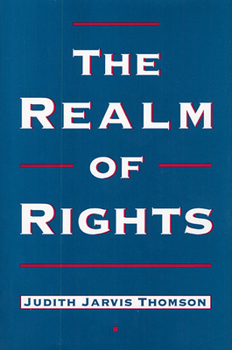The Realm of Rights
Select Format
Select Condition 
Book Overview
The concept of a right is fundamental to moral, political, and legal thinking, but much of the use of that concept is selective and fragmentary: it is common merely to appeal to this or that intuitively plausible attribution of rights as needed for purposes of argument. In The Realm of Rights Judith Thomson provides a full-scale, systematic theory of human and social rights, bringing out what in general makes an attribution of a right true.
Thomson says that the question what it is to have a right precedes the question which rights we have, and she therefore begins by asking why our having rights is a morally significant fact about us. She argues that a person's having a right is reducible to a complex moral constraint: central to that constraint is that, other things being equal, the right ought to be accorded. Thomson asks what those other things are that may or may not be equal, and describes the tradeoffs that relieve us of the requirement to accord a right. Our rights fall into two classes, those we have by virtue of being human beings and those we have by virtue of private interactions and law. Thomson argues that the first class includes rights that others not kill or harm us, but does not include rights that others meet our needs. The second class includes rights that issue from promises and consent, and Thomson shows how they are generated; she also argues that property rights issue only from a legitimate legal system, so that the second class includes them as well. The Realm of Rights will take its place as a major effort to provide a stable foundation for our deeply held belief that we are not mere cogs in a communal machine, but are instead individuals whose private interests are entitled to respect.Format:Paperback
Language:English
ISBN:0674749499
ISBN13:9780674749498
Release Date:January 1992
Publisher:Harvard University Press
Length:400 Pages
Weight:1.28 lbs.
Dimensions:1.1" x 5.9" x 9.3"
Customer Reviews
1 rating
What are rights, and which ones do we have?
Published by Thriftbooks.com User , 23 years ago
This fine volume by Judith Jarvis Thomson may be the best analysis of rights out there.Thomson breaks her discussion into two parts. In roughly the first half of the book, she carefully analyzes what it means to have a "right." In the second, she sets out to determine, as far as possible, just exactly _which_ rights we have.Part one leans heavily on Wesley Hohfeld, a legal theorist who in the early twentieth century wrote two seminal papers (I hate describing papers as "seminal," but these two really are) on the taxonomy of legal rights, claims, duties, and so forth. Thomson imports Hohfeld's taxonomy into her discussion of moral rights, in the process subjecting it to exacting scrutiny (and some tweezing), and uses it as a foundation for a thorough analysis of just what is involved in possessing a "right."Part two sets out a clear analysis of the usual classical-liberal/libertarian rights to life, liberty, and property. Here I shall comment only that if Ayn Rand had written with half the clarity, rigor, and just plain _reasonableness_ that Thomson brings to bear on this topic, she might have been the philosopher she thought she was. (And she wouldn't have tried to reduce ethics to rational self-interest.)But Rand's handwaving non-account of reason would have caved in if she had tried to use it for anything like this. Thomson's foundational claim, as explained in an introduction that alone is worth the price of the entire book, is that we really do have rational insight into necessary moral truths; she therefore stands firmly in the rationalist-intuitionist line of succession that Rand rejected. (Thomson mentions W.D. Ross only once, in a footnote, but she is clearly on his side on the topic of "prima facie duty." She doesn't think he gave a fully satisfactory account of such duties -- well, neither do I -- but she is certain that we all know what it was he was trying to give an account _of_.)I therefore -- despite some disagreements, notably with Thomson's well-known conclusions on abortion -- highly recommend Thomson's incisive account of rights to one and all in the classical-liberal/libertarian camp. If more such accounts were written to this standard (rather than to Rand's), "pop libertarians" (or what Murray Rothbard called "modal libertarians") would have a harder time regarding themselves as philosophers merely because they had read ATLAS SHRUGGED ten or twenty times.I also recommend it to everybody else, and especially to law students (at least the ones with time to kill). Thomson's account of moral reasoning, like Ross's, looks an awful lot like the sort of _legal_ reasoning we all get to practice in law school.Warning: Thomson is a very graceful writer and her prose is occasionally wryly humorous. But above all it is precise and dense; don't expect to read through this book in a single sitting, or even in ten such sittings. It _isn't_ hard to read, but you'll need to take your time: Thomson packs more into a paragraph of her adamantine





